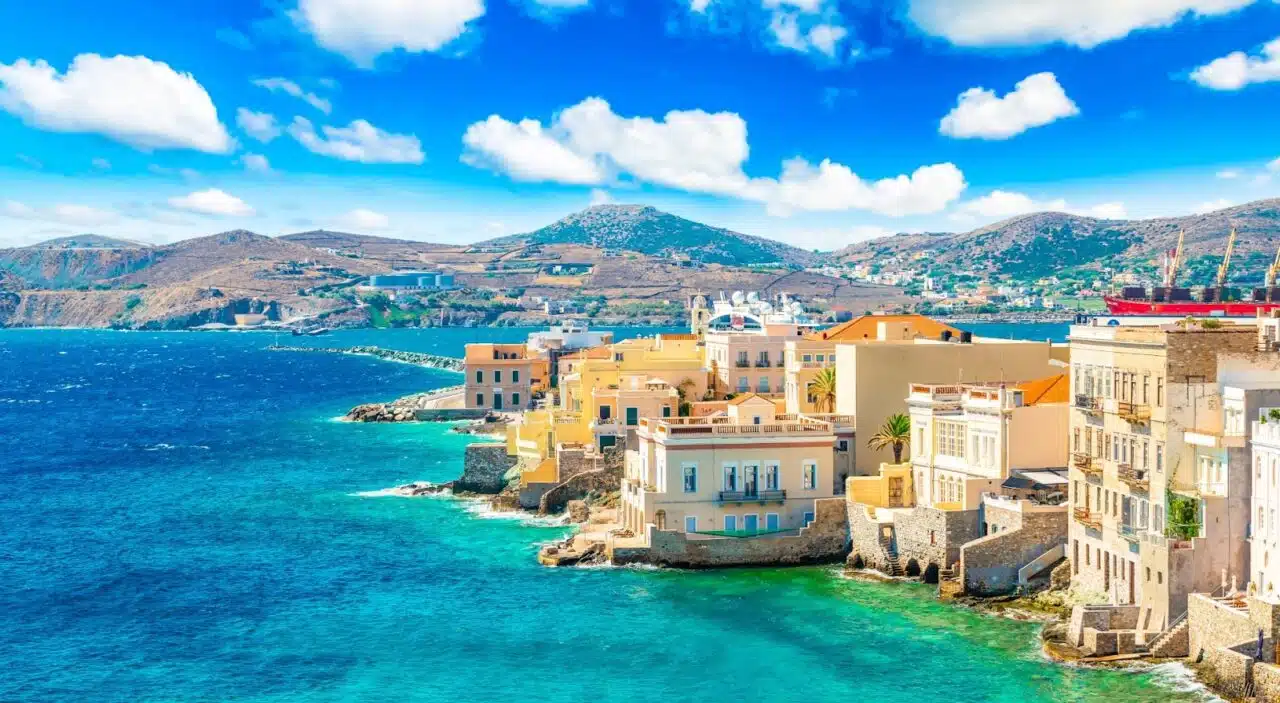Historic gems, pristine beaches, and spellbinding sunsets—these are the things that make Greece an utterly unique destination. Moreover, few places combine all this with enviable nightlife, perfect weather, and a laidback culture that welcomes everyone. But this picture-perfect country has another enviable secret: there’s not a bad time to visit. From the dead of winter to the heat of summer, Greece promises historical enrichment, fun-filled adventures, and breathtaking coasts. So, with that said, here is everything you need to know to choose the best time to visit Greece for you and for your budget.
This post may contain affiliate links. Making a purchase through our site may earn us a commission at no additional cost to you. This does not affect the independence or quality of our content.
Table of Contents
The Weather in Greece
Greece is a country for all seasons, and each one has something special to offer, from uncrowded beaches to gorgeous blue skies. So whether you’re planning your summer getaway or gearing up to make your winter escape, Greece welcomes you with warm arms and beautiful shores.
Spring (March to May)

March heralds the arrival of spring in Greece. From stunning wildflowers in Crete to towering olive groves in Corfu, the islands become a haven of natural beauty and adventure. Daily temperatures warm to the low 60s in March and rise to the mid-70s in May, with rain taking a backseat to allow for plenty of sunny days. The pleasant weather means you can abandon the heavy wardrobe for an array of light shirts and jackets.
Visitors can comfortably enjoy the beaches, where it’s warm enough to swim, or seek adventure inland, where it’s still pleasantly cool. As one half of Greece’s shoulder season, spring also offers enticing deals, with cheaper airfares and hotel rates. The affordable pricing and spectacular weather make late spring an idyllic time to head for the Greek Islands. While summer is a sought-after gem, spring is one of Greece’s best-kept secrets.
Best Time to Visit Greece for Great Weather
Summer (June to August)

Summer is the darling season of Greek travel, with warm weather and sunny skies enticing the masses to crowd the country from its interior to its shorelines. Tourism begins to swell in June, along with the heat, before midsummer sweeps in with peak crowds and temperatures. Average highs can reach 91°F in July and August, making this a perfect time to flee to the beaches to cool off in the sea and sunbathe.
Despite the heat, many take advantage of the sunny weather to explore, from hiking spectacular trails in Crete to delving into archeological sites in Attica. For summer travel, always book accommodations in advance to avoid the worst price hikes—or getting booked out entirely—and for slightly cheaper rates but still fantastic weather, consider an early summer getaway in June.
Best Time to Visit Greece for the Greek Islands and Beaches
Autumn (September to November)

Come September, summer makes its exodus, and so do the warm-weather vacationers, ushering in a quieter period on the Greek Islands. Autumn brings much-needed relief after the scalding summer, with mild weather returning the nation to more bearable temperatures. The average high in September hovers around the low 80s before dropping to the 70s in October and the 60s in November.
While the days are slightly nippier, the sea temps remain reasonably warm, giving travelers a myriad of choices for things to do. And because fall is the other half of Greece’s shoulder season, visitors can also take advantage of uncrowded attractions and great deals on hotels, airfare, and even ferry tickets. September hits the sweet spot for great weather and affordable prices to go island-hopping, but the whole season presents an excellent opportunity for sightseeing, hiking, and other outdoor activities.
Best Time to Visit Greece for Deals
Winter (December to February)

Winter might not be widely regarded as the best time to visit Greece, but make no mistake—you won’t regret planning a winter getaway to the Greek Isles. Though lacking the typical, warm-weather charms that most have come to know and love, Greece makes up for this with magical winter wonderlands. The northern region never fails to enchant, with snow-dusted villages, snow-capped peaks, and snow-covered slopes.
Further south, the coast promises milder winter weather, though winter brings the rainy season and a fair bit of rainfall in its wake. Still, Crete and other Greek Islands boast plenty of days of sun and the kind of pleasant Mediterranean climate that will make you forget it’s winter in other parts of the world. While you’ll encounter some closures due to the low season, winter is the best time to take it slow on the islands and drink in the beauty and culture permeating every inch of the country.
Best Time to Visit Greece for Fewer Crowds
Greece’s Most Popular Annual Events

Greek culture has evolved over thousands of years, beginning in the Minoan and Mycenaean periods. Objectively, that’s a lot of culture to catch up on. Luckily, for those feeling intimidated, the country’s annual festivals give a colorful and lively first step into learning about the diverse cultures that make present-day Greece so unique!
Epiphany (January)
Dating back to ancient times, Epiphany marks the end of the Christmas celebrations with, you guessed it, its own special celebration. The Holy Feast Day, also commonly called Theophania or Fota, commemorates the revelation of Christ as the Messiah and marks one of only two occasions when the Holy Trinity revealed themselves to humanity at the same time. The event is celebrated nationwide on January 6 with different rituals, but the most important tradition is the blessing of the waters by a local priest. The priest will throw a Holy Cross into the water, and the faithful will jump in after it. Whoever finds and returns the Holy Cross to the priest will be blessed for the coming year.
Apokries (February/March)

The end of winter signals the arrival of the carnival season. Like others worldwide, the Greeks do not waste this “last chance” before Lent to drink and be merry. Apokries is the nation’s official period of partying, eating out with friends and family, drinking, dancing, and celebrating—making it the best time to visit Greece if you’re in the mood for wild parties and joyous celebrations.
Patras is king when it comes to throwing the biggest and wildest of parties, with a grand parade and people dressed in colorful costumes and masks. But celebrations occur all over Greece, even in towns as small as Tyrnavos, where celebrations take the form of a Phallus Festival, attendees wear questionable costumes, and people parade through the streets carrying phallic symbols. Meanwhile, in Corfu, visitors are transported to a bygone era of fun and frivolity, with men and women dressed in rich Venetian costumes and colorful masks in a fairytale-like event straight from the streets of Venice.
Orthodox Easter (March/April)
The most important religious feast of the year, Greek Orthodox Easter, or Pascha, continues traditions dating back thousands of years—think timeworn fasting rituals, candle-lit processions, and lambs roasting over an open fire. These are just some traditions observed throughout the country, along with more lively celebrations like street parties and late-night fireworks. Even for the non-religious, Easter can be a magical and moving time to experience Greece. Visit beautiful churches during the Holy Week and watch fireworks light up the night sky after Midnight Mass. On Easter Sunday, families and friends gather to create special dishes for the holiday, from tsourekia, Greek Eastern bread, to pastitsio, baked pasta. Orthodox Easter is a time to pay heed to old traditions and celebrate with family and friends in the present.
August Moon Festival (August)

The full moon in August might not seem like anything special, but in Greece, this is a night unlike any other. While the summer moon is at its brightest and most beautiful, venues all over Greece stay open late into the night, welcoming visitors inside their revered halls for free! For one night of the year, elusive locations like the Acropolis and the Roman Agora invite visitors inside and put on moving moonlit theater and dance performances. While the most popular places are often in Athens, travelers can find venues all over Greece, from the sacred island of Delos to the glamorous island of Mykonos. Each year, the program changes, meaning no two August Moons in Greece are ever the same and promising a summer night you won’t soon forget.
Thessaloniki International Film Festival (October/November)
Thessaloniki is Greece’s undersung second city. Between the vibrant nightlife and rich cultural history, you likely don’t need more reasons to visit. Still, the Thessaloniki International Film Festival provides something special to add to your itinerary. An essential stop on the international film circuit, Thessoliniki’s film festival manages to fill its 10-day itinerary with over 100 films, panel discussions, and film seminars. With famous attendees, from directors to actors alike, it’s an unmissable event for film lovers and anyone interested in the craft of filmmaking.
Know the Best Time to Go

There simply isn’t enough time in the world to explore all of Greece’s historical, cultural, and natural gems. But if you know what you want out of your trip, then it’s much easier to narrow down the best time for you to visit Greece. So whether you want to soak up the sun or delight in crowd-free museums, here are the best times to go to Greece.
The Best Time to Visit Greece for Low Prices
You can find plenty of deals and enticing offers in the low season during winter, but if you want the best of worlds—pleasant weather and affordable prices—plan your trip for the fall. Greece’s shoulder season stretches from March to May in the spring and September to November in the fall. While both promise excellent weather and great prices, Greek Orthodox Easter, which often falls around the end of April or early May, can cause price hikes for accommodations in some areas. The fall season largely avoids this problem, so if you want the best of great weather and pricing, you are all but guaranteed to get the most out of your trip to the Greek Isles at this time.
The Best Time to Visit Greece for Fewer Crowds

Winter reigns supreme for encountering the fewest crowds in Greece. Despite the country’s many winter charms, Greece isn’t on many people’s lists as a top winter getaway. According to CEIC DATA, fewer than 800,000 people visited Greece in any single month in winter, down from the 6.4 million who visited in August of 2023. So, if you want to avoid the worst of the crowds, this is the perfect time to explore Greece unimpeded by the summer masses. Just be prepared for a few closures. With the low season, some hotels and venues close, so it’s best to check what accommodations are available ahead of time. Also, remember to pack your raincoat and umbrella, as winter coincides with the rainy season, and that brings with it snow in some regions. So, if you’re headed north, don’t forget to pack some warmer clothes!
The Best Time to Visit Greece for Good Weather
Greece is a land of blue skies, mild weather, and sunny coasts nearly all year round, with places like Crete boasting roughly 300 days of sun. But if you want guaranteed picture-perfect weather outside of Crete, set your sights on the spring or fall. Spring sees the temperature gradually warming from a pleasant 60°F in March to a much warmer 80°F in June, perfect for enjoying the beaches of Greece and experiencing the best of islands like Santorini and Rhodes while they’re in bloom. The fall is nearly as lovely, with cool but still largely inviting temperatures from September to November, and spots near the coast remain warm even as winter creeps closer.
The Best Time to Visit Greece for the Islands

The best months to visit the islands in Greece are May, June, and September. The weather is warm, and the crowds have yet to descend or have just left. Travelers will have much better luck scoring a shoulder-season deal on everything from hotels to ferry prices during this time. While summer is seen as a popular season for island-hopping, it’s best to steer clear of it for that very reason. As the heat swells, so do the crowds, making this a better time to travel inland if you want to plan a trip to Greece in the summer.



